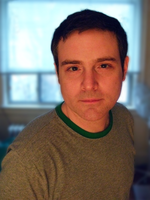 David Whitton Photo by Millie Whitton David Whitton grew up in London, Ontario and now lives in Toronto. His stories have appeared in the following journals and anthologies: The Dalhousie Review, The New Quarterly, Taddle Creek, The Fiddlehead, Best Canadian Stories, The Journey Prize Stories, and Darwin's Bastards. David Whitton is launching The Reverse Cowgirl in London, Ontario at the Forest City Gallery on December 2, 2011 at 8:00pm. See the Facebook event page for more details. RUSTY TALK WITH DAVID WHITTON Kathryn Mockler: What is your first memory of writing creatively? David Whitton: I wrote a Hardy Boys novel when I was eight or nine. Can't remember the title, but it was probably something along the lines of The Mystery of the Fuzzy Kitten Bellies. It was three, four, five pages long. I remember nothing about it, except that I desperately wanted to impress my oldest brother, Jim, who made an effort to fawn over it. His reaction to that novel kept me motivated for decades. KM: What keeps you going as a writer? DW: The three Ds. Delusion, denial, and desolation. Also the feeling, for just a few minutes every day, that all the moments in my life that I’d thought I'd pissed away actually have some sort of purpose. Because it all comes back to you, doesn't it? The girl you made out with in the park in grade ten. The surreal conversation you had with your uncle three months before he left the earth. It all comes back. These evanescent moments that you, privileged person that you are, now get to sink into amber. What a gift. KM: What is the revision process like for you? DW: It's like a women's prison movie. Except that I'm both the perverted, sadistic warden and the wrongfully convicted inmate. It's full of relentless self-abuse and almost existential self-questioning. But what can I do? It’s what I signed up for. KM: Rejection can stop new writers before they start. How did you deal with rejection when you first started out? DW: I rewatched Alexander Mackendrick’s great sleazeball drama, The Sweet Smell of Success. I reread Jesus' Son and A Good Man is Hard to Find and Will You Please Be Quiet, Please? I listened to Raw Power and The Velvet Underground and Nico and No Wow and confirmed to myself that my aesthetic was sound. It's important to remember that tons of people, even people in positions of power, don't know what they're talking about. Editors, publishers, and agents will often make decisions based on the most superficial of criteria. But if you’ve placed yourself in a continuum that includes Denis Johnson, Flannery O'Connor, and Raymond Carver, then no one can touch you. KM: What authors or books would you recommend to new writers? DW: I wouldn't. One thing I've learned, or am trying to learn, is that no one else's opinion counts for shit. Taste is identity. When you figure out what rocks you out, you figure out who you are and how you write. No one else matters. KM: Do you have a piece of literary advice for aspiring writers? DW: Avoid writers. Spend most of your time with electricians. Or bipolar No Frills cashiers. Or new-age construction workers. Or downward-spiralling Coffee Time franchise owners, or schizophrenic former bread-truck drivers, or women who used to be men. These are the people who will teach you how to live, and therefore how to write. And they'll give you your best material. KM: Your funniest literary moment, if you have one. DW: Most of my literary moments are unspeakably tragic. But I do cherish the memory of my wife Brenda coming into the kitchen and telling me that my book, The Reverse Cowgirl, had reached number 69 in the Amazon.ca short story charts. KM: What are you working on now? DW: My dream project. An epic southwestern Ontario white-trash crime novel. A while ago I met James Ellroy and got him to write "I'm yo daddy" in my copy of Blood's a Rover. I intend to prove him right. He's my literary daddy, at least for one book. 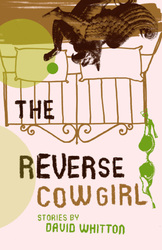 DAVID WHITTON'S MOST RECENT BOOK The Reverse Cowgirl, Freehand Books, 2011 Description from Freehand Books: Keen, intense, and darkly comic, the short stories of David Whitton are full of misfits, oddballs, dropouts, klutzes, and loners. You might dress em up, but it’s just a matter of moments till they unravel back into their fallen, and fascinating, selves. Their mistakes and misdeeds, temptations and transgressions thread their way through these stories, stirring up surprises on every corner. Whitton navigates current life and future worlds, dirty truths and murky fantasies, continually setting up, if only to send up, modern romantic scenarios. In the end, whether the lovers meet online or on acid, at a wedding or in battle, the object of ardour might be in for a rough ride. Maybe they’ll stay afloat—tremulous and tentative—or plunge to earth in delightful and refreshing ways. Praise for The Reverse Cowgirl “The Reverse Cowgirl is both hilarious and horrifying, as startling and poetic as a gargoyle dropped on one’s head, a corpse with a plastic flower instead of a face. Whitton writes the way a master painter paints—just a few well-placed strokes of his brush and he reveals worlds of vast and mesmerizing complexity. The characters in these stories are all at a loss in some way, and with his frightening talent Whitton makes readers care deeply for them, even while ashamedly laughing at them. He is marvelous in his ability to show the comic in the tragic, and he constantly forced me to question my own ethics, my own place in the world. A truly gifted writer and a truly kick-ass short story collection.” —Suzette Mayr 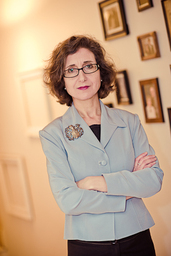 Maria Meindl Photo by Kathryn Palmateer Maria Meindl is the author of Outside the Box: the Life and Legacy of Writer Mona Gould, the Grandmother I Thought I Knew from McGill-Queens University Press, a story “The Last Judgment” from Found Press and “Rules” an essay in an anthology on death published by Creative Non Fiction. Her essays have appeared in The Literary Review of Canada, Descant and Musicworks. She has made two radio series for CBC Ideas: Parent Care, and Remembering Polio. She is the founder of the Draft Reading Series (now in its seventh season) which features work by new and established writers. Maria Meindl has two London readings this week: The University of Western Ontario November 23, 2011 @ 12:00pm to 1:00pm, North Campus Building, 2nd Floor room 295 Fanshawe College November 24, 2011 @ 2:00pm to 3:00pm, Room D1060, 1001 Fanshawe College Blvd. RUSTY TALK WITH MARIA MEINDL Kathryn Mockler: How did you first come to writing? Maria Meindl: As a small child I spent a lot of time with my grandmother, who had been a well-known poet, journalist and broadcaster from the 1930s to the 1950s. Right around the time I was born she was disappearing from the public eye. She felt hurt and bitter about it and planted all her hopes on me. It was a given that I would follow in her footsteps. It never occurred to me that I had a choice. At the age of eight I wrote a poem, which felt like it came to me by divine inspiration. My grandmother said it was a tour-de-force, my teacher praised it as “sensitive,” and a lifetime of literary misery was born. I felt I had to fulfill my destiny as a writer, yet I gave myself no room to experiment, no permission to fall on my face. Furthermore I was a one-trick “sensitive” pony; anger, sexuality, clear and incisive thought all fell outside my very limited range. Oh, and tyrannized by that “divine inspiration,” I was afraid to roll up my sleeves and rewrite anything. It took years--and I mean years--to get over it. I started writing at the age of eight and published my first book, Outside the Box, this September at the age of 52. By the way it’s about my grandmother and our relationship. KM: What keeps you going as a writer--especially when you are working on a project that is years in the making? MM: I’m a very, very determined person, and I hate to give up. It’s in my nature, or deeply conditioned. I should say that this is not a healthy quality in most circumstances. If you only knew the horrible relationships and bad jobs I have spent years trying to “fix”! For my emotional and physical health, I have had to learn to turn my tenacity off at times and cut my losses, but it is a strength when it comes to writing, especially when your projects take twelve years to finish. (This was the case with Outside the Box.) I should also say I think that tenacity can be learned if you don’t have it. KM: What is the writing process like for you? Is it different when you are writing in different genres? MM: For Outside the Box, all the fraught history with my grandmother seemed to infuse the process I felt like my brain was bleeding most days when I’d been working on it, and this went on for years. But I got through it. Lately I have also been writing fiction. A totally different experience. It is joyful, though all writing comes hard to me and fiction is no exception. This may be because in the past few years I have been exploring movement and voice. I don’t feel a direct link with the writing process, but I do feel my writing has become more embodied, sexier and more fun. Also I am less cautious and more direct in the way I say things. KM: How do you approach revision? MM: I am much better about revision than I used to be. Once I get past my usual “oh my God it isn’t perfect!” panic I enjoy it. It’s oh so satisfying to dig into the richness of the initial draft and feel it transform into something more evolved. It also helped to take a philosophy degree as a mature student. We would critique each other’s papers minutely, but there was something good-natured and co-operative about the process. In that context, it’s known that by critiquing someone’s work, you help them reinforce their argument because you help them anticipate what others might say. When I applied this to creative writing the whole process got easier. Now I consider any and all critiques, no matter how they are presented. I have had some wonderful editing, especially on Outside the Box, but I’ve endured a lot of pure, unconsidered meanness over the years, and I’m sure it’s not over yet. I don’t care any more. If the editor can’t be diplomatic, it’s not my problem; meantime, the work improves, and I get the credit anyway. KM: How did you deal with rejection when you first started out? MM: Um, how about now? I am and have always been devastated by rejection. I take it personally, and it brings up painful rejection issues from my past. It’s getting worse and not better with time. However…I don’t let that stop me! My method is as follows: when something is rejected, I stop working and go into mourning for 24 hours. I allow myself to be overwhelmed with my darkest self-doubts. I resolve to quit. Next day, I consider the editor’s comments carefully (if I’ve been lucky enough to get them). I make changes if necessary. Then I put it BACK IN THE MAIL. I wrote a story in 1986 called “The Last Judgment.” I began submitting it to literary magazines. It was rejected about 20 times, always with the comment that it was too long. Each time I was flattened. I kept sending it. Last year it was accepted by Found Press, which does really good and innovative e-publications, and which treats short stories like books, with all the attendant publicity and marketing (and an advance). It was the ideal length for Found Press. KM: What authors or books would you recommend, especially to creative nonfiction writers? MM: I have read some great Canadian nonfiction. Recent favourites have been The Year of Finding Memory by Judy Fong Bates, The Boy in the Moon by Ian Brown, anything by Marni Jackson. I was very affected by Dreams from My Father by Barack Obama: such a beautifully written book and an ideal balance between anecdotes and thoughtful analysis. Also, I keep returning to Silences by Tillie Olsen--not only for the content but the unique structure. KM: Do you have a piece of advice for new writers? MM: The literary community needs you, NOW, no matter how inexperienced, awkward, over-committed or downright weird you think you are. I have run a reading series (Draft) for seven years now and our volunteers are like gold. We cannot do without them, and we always need more. Get involved with something--publications, events, or whatever you like. Or start something. The big established organizations we have now began with a few people who gathered together in a basement or departmental lounge of their university and made things happen. They made mistakes and learned along the way. You will have a lot more fun and the more people who do this, the bigger, more welcoming and more diverse the literary scene will be. KM: Your funniest literary moment, if you have one? MM: My authors’ copies of Outside the Box were delivered on the front porch at one and the same moment as the earthquake in Toronto August 23, 2011. KM: What are you working on now? MM: I’m writing a series of three novels working back through history from 1980s Toronto to post-WW2 London to Weimar Berlin. Isn’t it nice that I’ve got over putting too much pressure on myself? 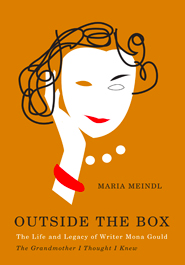 MARIA MEINDL'S RECENT BOOK Outside the Box, McGill-Queen's University Press, 2011 Description from McGill-Queen's: When poet and broadcaster Mona Gould died in 1999, she left behind thirty-eight boxes of papers. Her war poem, "This Was My Brother," was still a staple of textbooks and anthologies, yet Mona - well known in her youth - had fallen into obscurity in the 1960s. Born at the very time Mona's career was faltering, Maria Meindl became a captive audience for her grandmother's extravagant stories of the past. Years later, Maria took on the daunting task of sorting through Mona's mountain of papers to create an archive for the University of Toronto's Fisher Rare Book Library. The chaotic state of the boxes reflected Mona's flamboyant and demanding personality, yet they also drew an important picture of the life of a Canadian freelancer in the twentieth century. Mona had begun publishing poetry and features in newspapers in the 1920s and published three books of poetry in the 1940s. In the 1950s, at a time when many women were retreating from the public sphere, she had a successful radio career. Her later journals and letters recount, in agonizing detail, a downward spiral into self-doubt, poverty, and addiction. Maria soon discovered that the truth of Mona's life was even more fascinating than her stories. Outside the Box brings to life a thinly documented era in Canadian letters through the story of one passionate and conflicted woman. It also charts the journey of an unwilling archivist, coming to terms with family secrets, forgotten history, and the stories that are never told. Review quotes "Not content merely to provide an account of Gould's life and times, Maria Meindl probes the complexities of her own relationship with this remarkable woman. I thoroughly enjoyed this book and found it rewarding on multiple levels." Susan Olding, author of Pathologies: A Life in Essays "Encompassing literary, social, and women's history, personal memoir, and media studies, Outside the Box is honest, revealing, and original." Elaine Kalman Naves, author of Shoshanna's Story 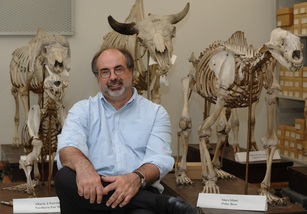 Monty Reid Photo by John W. MacDonald Monty Reid was born in Saskatchewan, lived for many years in Alberta, and moved to the Ottawa area in 1999, where he worked, until recently, as Director of Exhibitions at the Canadian Museum of Nature. Among his publications are The Life of Ryley (Thistledown), The Alternate Guide (rdc), Crawlspace (Anansi), Dog Sleeps (NeWest), and The Luskville Reductions (Brick). Chapbooks include Fridays (Sidereal), Six Songs for the Mammoth Steppe (aboveground), Sweetheart of Mine (BookThug) and the recent Site Conditions (Apt 9). Units from his 12-part Garden sequence have been published in Canada, Japan, France, England and the US. He has won numerous awards: 3-time winner of Alberta’s Stephansson Award for Poetry, a national magazine award, 3-time nominee for the Governor-General’s Award for Literature. His first Ottawa book, Disappointment Island (Chaudiere Books, 2006), was shortlisted for the City of Ottawa Book Award and won the city’s Lampman-Scott Award for poetry. He plays guitar and mandolin in the band Call Me Katie and continues to live in Ottawa. RUSTY TALK WITH MONTY REID Kathryn Mockler: How did you first come to writing poetry? Monty Reid: I first started writing poetry in Grade 10. We had been studying TS Eliot, but mostly I wanted to impress the girl who sat in front of me in English class. It didn't work, and I played hockey instead. It wasn't til half way through university that I realized the courses that really held my attention were literature and philosophy. So I dropped out of law and concentrated on English and soon started writing again. The literary community seemed to be exciting and open, some of my work was published in little magazines (Nodding Onion, White Pelican and others) and folks like Doug Barbour and Bert Almon were very supportive, so it was a positive experience early on and, by and large, it's remained that way. KM: What keeps you going as a poet? Or why do you write? MR: I write against loneliness. I mean that both on individual and social levels. There is so much in our society that works to fragment and isolate and dis-join people, whether it be at the level of personal relationships, or city planning, or global capital, that I think one of the great things writing can do is help build community. Plus, having written gives me a kind of quiet rush that I don't get anywhere else. I play in a band and the rush that musical performance provides is related and certainly more immediate, but it doesn't have the same level of complexity or the same patient development. I like them both, but the one that comes from writing has more endurance. KM: What is the revision process like for you? MR: The revision process is non-systematic for me. Just like I believe there is no one way to write a poem, there is no single way to revise. Different writers find different ways to do it. Some poems I have fiddled with for 30 years and still haven't published them. And there are some, not many, that I have deliberately not revised because I wanted them to be a record of immediate response. There are two things that are fairly typical for me though: once I put a manuscript together for a publisher, it gets a pretty thorough going over and two, I tend to work in sequences and I see every poem in the sequence as a revision, in some, often minor, way, of the poems that precede it. KM: How did you deal with rejection when you first started out? MR: I once tried to get into a fiction class at the University of Alberta, and the prof that ran it looked at my work and said, "...trying to teach you how to write would be like teaching a deaf man how to play the piano." So I wrote poetry. KM: How would you describe the writer/editor relationship? MR: It's a necessary one, if you intend to publish your work. If you're publishing, you obviously want others to read your work, and an editor is there to help that cause. In practice, it can be a fine experience or a frustrating one. In the end though, the writer needs to remain loyal to the work and not to the editor. KM: What authors or books would you recommend to new poets or writers? MR: Many, of course. And every writer needs different things at different times. For new poets, I think they need to start with their contemporaries because the language, the issues, the recognitions there will be most immediate and applicable, and the sense of possible community the strongest. Then find out where your contemporaries came from, and why. Without this, your work will become just a sampler of trends. KM: Is there an author that had a significant impact on your literary life? MR: As above, I've needed different things at different times. I've been influenced by writers as different as Robert Kroetsch and Elizabeth Bishop, bp Nichol, and Yehuda Amichai. But the guy I always return to is William Carlos Williams. I like that he didn't move. KM: A piece of literary advice for new poets? MR: Yes. Read outside your discipline. And I don't mean substitute Elizabethan poetry for the Romantics. Learn something about fluid dynamics or animal husbandry or onions. The world is not a text, and you shouldn't be either. KM: Your funniest literary moment, if you have one. MR: Helping rob mclennan move. He neglected to say he'd moved into the top floor of a three-storey walkup. And he has a lot of books. We almost died. KM: What you are working on now? MR: Always more than one thing at a time. I'm getting some Garden units ready for publication by Red Nettle Press in Edmonton and Corrupt Press in Paris. I'm working on a set of responses for a photography show that goes up at the Society of the Photographic Arts of Ottawa in November. I'm revising a set of translations called After El Gran Zoo. Another sequence called Air Miles is under way. And I'm always looking for gigs for the band. 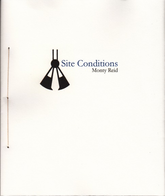 MONTY REID'S MOST RECENT CHAPBOOK Site Conditions, Apt. 9 Press, 2011 Description from Apt. 9 Press: There is no more exciting poet working in extended serial forms in Canada today than Monty Reid. Site Conditions writes the process of construction, and the tools for construction, in a series of twenty brief and deceptively simple poems. Questions of intention, memory, safety and failure are interrogated; “You will have to go / the way you fear the most.” 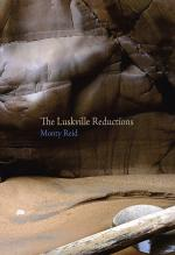 MONTY REID'S MOST RECENT BOOK The Luskville Reductions, Brick Books, 2008 Description from Brick Books: Shortlisted for the 2009 Lampman-Scott Award (for the best book of poetry in the National Capital Region) A book of lyrics, fragmented, extended, and recovered, which read as a single long poem. The Luskville Reductions records a year in the life of a small Quebec town and the marriage that disintegrates there. While a book about loss, it is also a book about the state of becoming that coexists with change, the imbalance that for a time makes everything lucid, all the details adding up to much more than only an "us." The visible goes beyond mere facts in these poems, transformed into the deeply seen - and therefore sacred. |
Rusty Talk
Rusty Talk Editor: Archives
November 2017
Categories
All
|

 RSS Feed
RSS Feed
